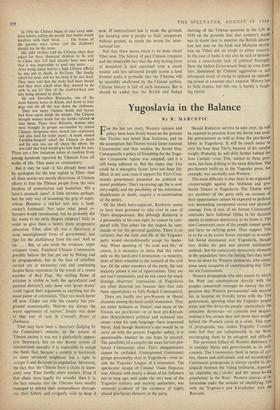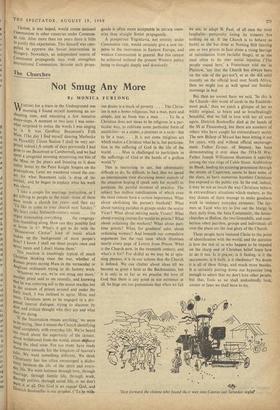Yugoslavia in the Balance
By R. MARCETIC FoRi the last ten years, Western opinion and policy have been firmly based on the premise that Titoism was better than Stalinism, and on the assumption that Titoism would foster national Communism and thus weaken the Soviet bloc. Consequently a policy of friendship for the Yugo- slav Communist regime was adopted; and it is still being adhered to. But the hopes that Tito could be a disruptive factor have not been ful- filled; in any case, even if support for Tito's Com- munist government presented no political or moral problems, Tito's increasing age (he is over sixty-eight), and the possibility of his retirement, disablement or death, require a re-examination of the policy.
Of the likely hefts-apparent, Rankovic seems to have been groomed to take over in case of Tito's disappearance. But although Rankovic is a personality in his own right, he cannot be com- pared with Tito either for the respect he com- mands or for his personal qualities. There is no certainty that the rank and file of the Yugoslav party would unconditionally accept his leader- ship. When speaking of 'the rank and file,' of course, it is necessary to stress that this refers only to the hard-core Communists—a minority, most of them schooled in the turmoil of the civil war. Of the other members of the party, the vast majority joined it out of opportunism. They are not real Communists, and do not count for much (foreign observers' impressions of Yugoslavia are often distorted just because they thus take these opportunists as fully-fledged Communists).
There are hardly any pro-Western or liberal elements among the hard-core Communists. They are either Stalinists or Titoists; and many of the Titoists are pro-Soviet—or at least pro-Khrush- chev (Khrushchev's political and technical suc- cesses—even his rude language—have impressed them). And though Rankovic's aim would be to carry on with the present Yugoslav policy, it is questionable whether he can hope to succeed. The possibility of a coup by the more fervent pro- Soviet Communists after Tito's disappearance cannot be excluded. Underground Communist groups presumably exist in Yugoslavia—even in- side the Yugoslav League of Communists. The spectacular escape of Colonel Vlado Dapcevic into Albania with nearly a dozen of his followers not so long ago, and under the very nose of the Yugoslav military and security authorities, was ominous evidence of the existence of highly placed pro-Soviet elements in the party. Should Rankovic survive to take over, he will be exposed to pressure from the Soviet and satel- lite governments as well as from the pro-Soviet lobby in Yugoslavia. It will be much easier to rock his boat than Tito's, because of his smaller weight. Probably he will drift farther behind the Iron Curtain—even Tito, subject to these pres- sures, has been drifting in the same direction. The pre-Summit build-up in the Yugoslav press, for example, was markedly anti-Western.
The main difficulty is that there is no organised counterweight against the Stalinists and pro' Soviet Titoists in Yugoslavia. The Titoists who are members of the party only on account of their opportunism cannot be expected to perform acts demanding exceptional moral and physical courage. Few, if any, of his former Communist comrades have followed Djilas in his decision openly to embrace democracy as we know it. The non-Communist mass of the people cannot speak and have no rallying point. They support Tito in so far as he resists Soviet attempts to re-estab- lish Soviet dominance over Yugoslavia, though they dislike his past and present totalitarian methods. But the consciously democratic elements in the population have the feeling that they have been let down by Western democrats, who some- times seem incapable of understanding that Tito- ists are Communists.
Western propaganda (the only means by which the West can communicate directly with the peoples concerned) manages to convey the im- pression that Western governments' sole interest lies in keeping on friendly terms with the Tito government, ignoring what the Yugoslav people want; and this drives the people—particularly the conscious democrats—to cynicism and despair, making it less certain they will throw their weight behind the Western cause in a crisis. This type of propaganda, too, makes Yugoslav Commu- nists feel they are indispensable to the West, encouraging them to be arrogant and difficult.
The persistent fallacy of Western diplomacy is to consider States and governments as its onlY concern. The Communists think in terms of par' ties, classes and individuals, and act accordinglY. Communist propaganda is always careful to dis- tinguish between the 'ruling (militarist, imperial. ist, capitalist, etc.) circles' and the 'peace-loving population' in the West : Western sources of formation make the mistake of identifying Tito with the Yugoslays and Khrushchev with the Russians.
Titoism, it was hoped, would create national Communism in other countries under Commun- ist rule. After more than ten years there is little to justify this expectation. Tito himself was com- pelled to approve the Soviet intervention in Hungary. Nowadays, an independent source of Communist propaganda may even strengthen international Communism, because such propa-
ganda is often more acceptable in certain coun- tries than straight Soviet propaganda.
A prosperous Yugoslavia, not entirely under Communist rule, would certainly give a new im- petus to the restiveness in Eastern Europe, and weaken Communism in general. But this cannot be achieved without the present Western policy being re-thought deeply and drastically.



































 Previous page
Previous page